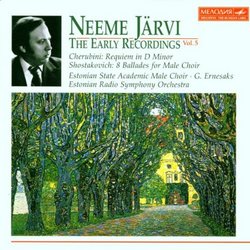| All Artists: Neemi Jarvi Title: Early Recordings 5 Members Wishing: 0 Total Copies: 0 Label: Melodiya Release Date: 9/16/1997 Genre: Classical Styles: Opera & Classical Vocal, Historical Periods, Classical (c.1770-1830), Early Music Number of Discs: 1 SwapaCD Credits: 1 UPC: 743214072325 |
Search - Neemi Jarvi :: Early Recordings 5
 | Neemi Jarvi Early Recordings 5 Genre: Classical
|
Larger Image |
CD Details |
CD ReviewsUnusual work-a rather interesting setting of the Requiem Jeff Lee | 01/13/1998 (4 out of 5 stars) "The Requiem in D, Cherubini's second funeral mass, was written as a response to the papal opposition to the performance of the first requiem, in C. The religious circles objected to the use of woman's voices in the performance of the requiem mass, and so Cherubini wrote one exclusively for male voices. It has been claimed that this secondary requiem is a more personal one, as Cherubini at this time as older and certainly more cognizant of his mortality. This requiem has not been recorded or performed often, when compared to famous ones like the Faure, Mozart, Verdi, and the other Cherubini masses. The listener can probably see why: it certainly lacks the operatics of Verdi, the gentle touch of Faure, and the visionaries of Mozart. Yet despite the fact that this is a requiem that is not always pleasurable to listen to, it is certainly a very notable one. This mass differs from many other requiems in that it features not only exclusively male voices but also no soloists. A listener who comes into the Requiem in D will not hear the dramatic solos of Libera me in Verdi's mass or the equally formidable voices of Cherubini's first mass. Instead, we hear a more austere setting of the requiem: more remniscient to old masses like those of Ockeghem than the classical and romantic settings. Which is not to say that this setting of the Requiem lacks excitement. The rising string line in Dies Irae is one of the most evocative interpretations of the Doomsday hymn. Here, Cherubini cuts right to the heart of the terror that must accompany any musical setting of the poem and doesn't lack in quality either. The male tenors and baritones proclaiming the "Day of Doom" sound just as awe-inspiring as those in Mozart's and Verdi's Requiem. Also very notable is the Agnus Dei- Cherubini seems to have a gift for writing settings for this prayer, for his masses all show rather notable interpretations of this part of the Catholic liturgy, and the Requiem in D is no exception. Overall, I found the Requiem to be a very unusual and interesting work. I certainly think that it draws back to the pre-baroque and baroque times. Even in the Dies Irae the mass is austere and dignified-none of the explosions of Verdi, nor the revolutions of Berlioz. Yet even though many times the all male voices can get to the listener accustomed to a mixed choir, the Requiem is unfailingly touching and certainly has a more personal stamp of the composer, as compared to the popular Requiem in C. Still, the work is a somewhat cold and unsettling farewell- I do think that it is best taken in with a mixture of other vocal pieces, in particular the Faure Requiem (which has been called "the perfect accompaniment" to any vocal music), or for a more dignified and otherworldly feel, the Allegri Miserere. The work as a whole is worthy of Cherubini, who was once hailed as the greatest living composer and is now far from fame. Beethoven certainly had reason to say, "If I were to write a Requiem, Cherubini's would be my only model." END"
|

 Track Listings (15) - Disc #1
Track Listings (15) - Disc #1